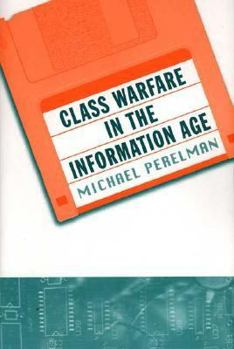Class Warfare in the Information Age
Select Format
Select Condition 
Book Overview
In Class Warfare in the Information Age , Michael Perelman reveals how the efforts of business to profit from the sale of information will result in a reduction rather than an increase in access to... This description may be from another edition of this product.
Format:Paperback
Language:English
ISBN:031222477X
ISBN13:9780312224776
Release Date:January 2000
Publisher:Palgrave MacMillan
Length:160 Pages
Weight:0.05 lbs.
Dimensions:0.5" x 5.5" x 8.3"
Customer Reviews
3 ratings
Good analysis of the information "revolution"
Published by Thriftbooks.com User , 19 years ago
In this accessible and entertaining book, Perelman documents the class nature of the supposed revolution in information, the extent to which their has been such a revolution, and its implications for economic policy. Perelman first questions supposed indicators of the extent to which an information economy has arisen. In addition to the usual arguments that the fact that certain jobs have become primarily informational doesn't indicate that the total amount of work relating to information has increased, Perelman explores the class nature of such phenomena. The development of capitalism has been a process in which the knowledge of workers has been expropriated and monopolized by capitalists. Thus, the number of job descriptions that are "informational" has increased, and most of these jobs are administrators who now deal with information that workers used to. Perelman shows how advances in information technology have been used to control the labor process. he cites examples of specific technologies that are inefficient but give capital greater control over labor. He also gives numerous quotes of higher ups in information technology companies explaining that this is the most important function of their product. He then shows how the deprivation of workers of information hurts innovation and product quality. A chapter on Panopticism outlines how informantion technology has been used for social control beyond the labor process. The last few chapters involve economic theory. Drawing heavily on Kenneth Arrow, Perelman shows how the theory taught in ECON 101 shows that information is a good to be produced by the state. Paul Krugman's latest awful micro intro text mentions this in fact, but only gives it a little space. the last chapter is a good criticism of Hayek's arguments about the informational efficiency of capitalism.
Good try and some good points
Published by Thriftbooks.com User , 23 years ago
I saw this in the school library as perhaps a left wing, no, marxist view of the sociology of cyberspace. It is a good attempt. Yes, it follows many of the current writers in sociology on cyberspace(like Castells) and the so called information revolution which I live everyday. It also looks at work and Taylorism well. I can't find any faults with it really. But does he do the title justice? I think, yes, he covers the sociology of work and the ideas of being replaced by a computer well. I also think he attempts to break out of the mold of much of the unoriginal writing being done on cyberpsace these days in the schools. He doesn't seem like a hipppy as one other reviewer noted. I don't get the idea that Perelman is a libertarian living on the West Coast nor do I think he is rich. He does seem to be an academic economist though. Good work Perelman!
Well worth the read, in spite of its faults
Published by Thriftbooks.com User , 25 years ago
We need intelligent critiques of Toffler-style rhetoric (as opposed to tirades by resentful hippies), and this is one. Lots of good ideas here. Problems: Perelman generalises so much he sometimes contradicts himself; the exclusively U.S. focus was frustrating to this foreigner (must be worse for non-Westerners); there might have been attention paid to the ways in which IT has been used as a means of resistance, to complete the picture. But it should be read. An excellent starting point for discussion.






